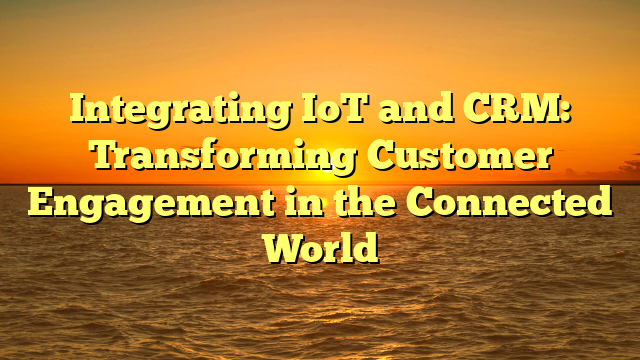In the era of the Internet of Things (IoT), where everyday objects are interconnected and generate vast amounts of data, businesses are exploring innovative ways to enhance customer engagement. Integrating IoT with Customer Relationship Management (CRM) has emerged as a game-changer, revolutionizing how businesses interact with customers in the connected world. This article explores the potential impact of IoT on CRM, highlighting how businesses can leverage this powerful combination to deliver personalized experiences and forge stronger customer relationships.
1. Real-Time Customer Insights
IoT devices, such as smart wearables, connected appliances, and sensors, collect real-time data on customer behavior and preferences. By integrating this data with CRM systems, businesses gain comprehensive insights into customer interactions and usage patterns. These real-time insights enable personalized offers and targeted marketing campaigns, enhancing customer satisfaction.
2. Proactive Customer Service
With IoT-enabled CRM, businesses can be proactive in addressing customer issues before they arise. Connected devices can send alerts and diagnostics data, allowing support teams to identify potential problems and offer proactive solutions. This approach improves customer service response times and prevents customer frustration.
3. Personalized Product Recommendations
IoT data provides a wealth of information about how customers use products. By analyzing this data in CRM, businesses can offer personalized product recommendations based on usage patterns. This targeted approach boosts cross-selling and upselling opportunities while enriching the overall customer experience.
4. Seamless Omni-Channel Experience
IoT integration enables a seamless omni-channel experience for customers. Data collected from various IoT devices and touchpoints is consolidated in the CRM system, ensuring a unified customer view. This allows customers to transition seamlessly between channels while receiving consistent and personalized interactions.
5. Predictive Maintenance and Service
In industrial IoT applications, businesses can leverage CRM data to implement predictive maintenance and service strategies. By analyzing IoT data from connected machinery and equipment, companies can predict when maintenance is required, reducing downtime and improving operational efficiency.
6. Smart Customer Engagement
IoT-enabled CRM allows for context-aware customer engagement. For instance, a retail store equipped with IoT beacons can send personalized offers to customers’ smartphones when they are in proximity to specific products. This smart engagement fosters a sense of relevance and enhances customer loyalty.
7. Continuous Customer Feedback
IoT devices enable continuous customer feedback and sentiment analysis. Companies can gather data on how customers interact with products and use this feedback to improve future iterations. This iterative process ensures that products align closely with customer needs and preferences.
Conclusion
The integration of IoT and CRM is transforming customer engagement in the connected world. By leveraging real-time customer insights, enabling proactive customer service, and providing personalized product recommendations, businesses can deliver exceptional customer experiences. The seamless omni-channel experience and predictive maintenance strategies further enhance customer satisfaction and loyalty.
IoT-enabled CRM ushers in a new era of smart customer engagement, where businesses can make data-driven decisions and build stronger customer relationships. Embracing this powerful combination empowers companies to thrive in the IoT landscape, where personalized and connected experiences are paramount to sustained business success.
